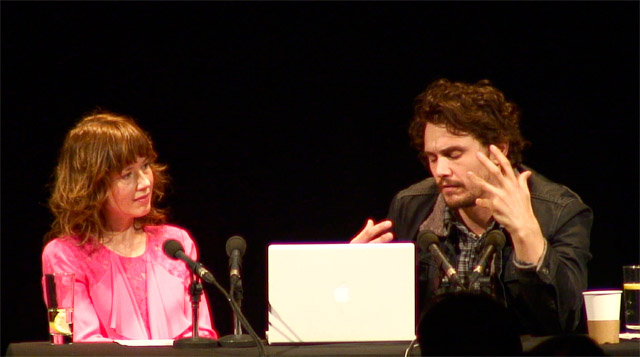James Franco is an actor. He’s also an artist, an author and occasional critic. Really, he’s a scholar and a voracious one at that. His tertiary credentials are staggering, with a degree from UCLA, a PhD program enrolment at Yale University and his own class at New York University, to name a few. If you look at the acknowledgments page on his 2010 book of loosely related short stories, Palo Alto, the list of names is extensive; best-selling writer Dave Eggers among them.
But with key roles in Spiderman, Milk and cult comedy Freaks and Geeks to his credit, Franco will forever be forced to justify his place anywhere outside of the profession that first made him famous. The thing is, in inaugurating the Institute of Contemporary Arts’ new Quickfire talks in London, he expresses no compulsion to do so. Instead, his position as a contentious artist on the international stage is given little attention. Organisers admit this was a rushed affair at the outset but for anyone attending the at-capacity event in the hope of shedding light on Franco’s position on where popular culture meets high art, they’re bound to be disappointed.

Those film students and fans come for a glimpse of the A-list star seem pleased but for those who were curious about the artistic implications of his General Hospital performance/installation piece or where he stands with his masculist preoccupations are left wanting. There’s a lot of talk about his Rebel exhibition, first shown at LA’s MoCA earlier this year, as well as a mention of Franco’s interests in the relationships between children and their parents but there’s little expansion on concepts that are loose at best. There’s a slideshow of selected works from the aforementioned exhibition that featured an all-male cast of the likes of Harmony Korine, Terry Richardson and Ed Ruscha but Franco elects to focus on the ‘whos’ and ‘wheres’ of the works, with none of the ‘whys’.
That said, if you’re of the opinion that an artist shouldn’t be expected to elaborate on his art beyond the work itself, then that is a valid stance to take. But if you’re not prepared to discuss the relevance of the artist himself, at least you can examine the relevance of a public discussion by an artist who eschews that very discussion.
To quote Girls co-writer Jenni Konner, responding to a review of the HBO series by Franco (this time in his guise as TV critic for the Huffington Post):
“I just didn’t understand what his thesis was. Do you know what I mean? Like I didn’t understand what he was actually saying…”
And when it comes to James Franco’s Quickfire talk at the ICA, neither did we.














